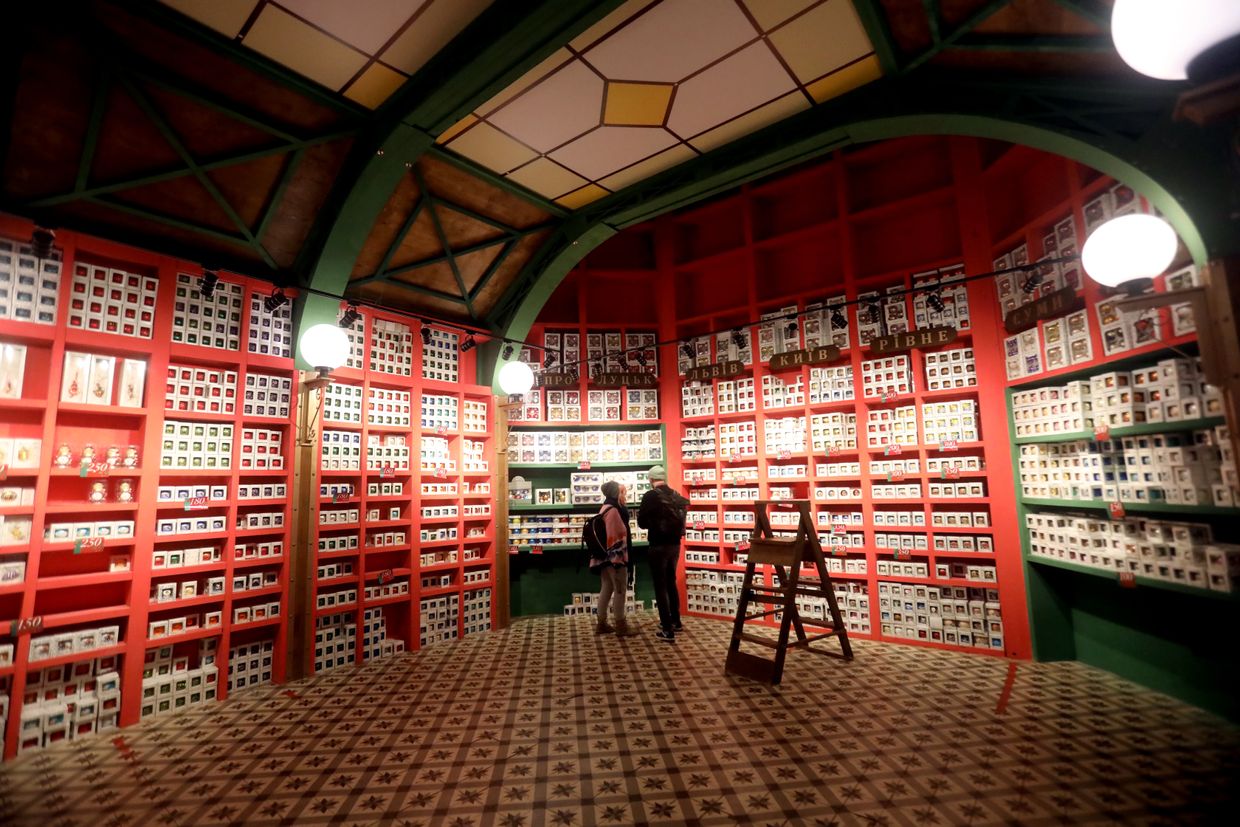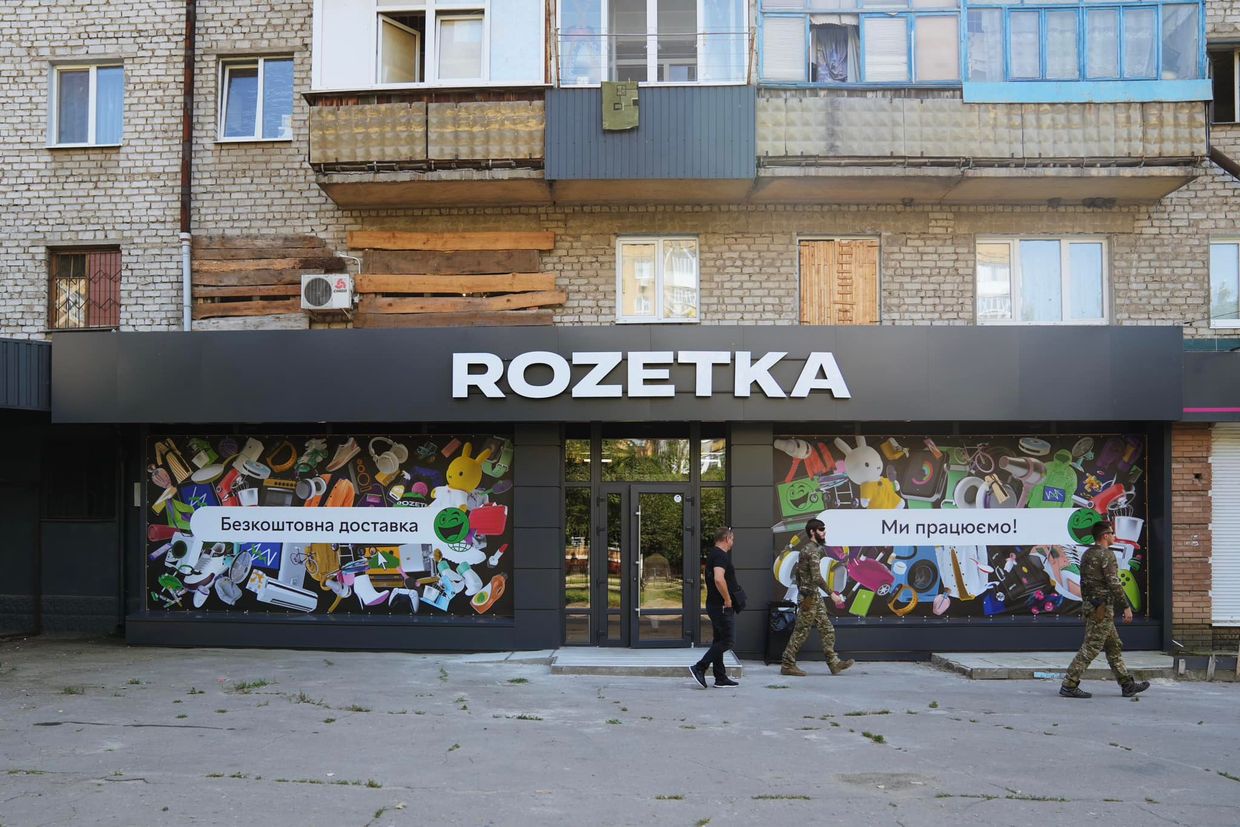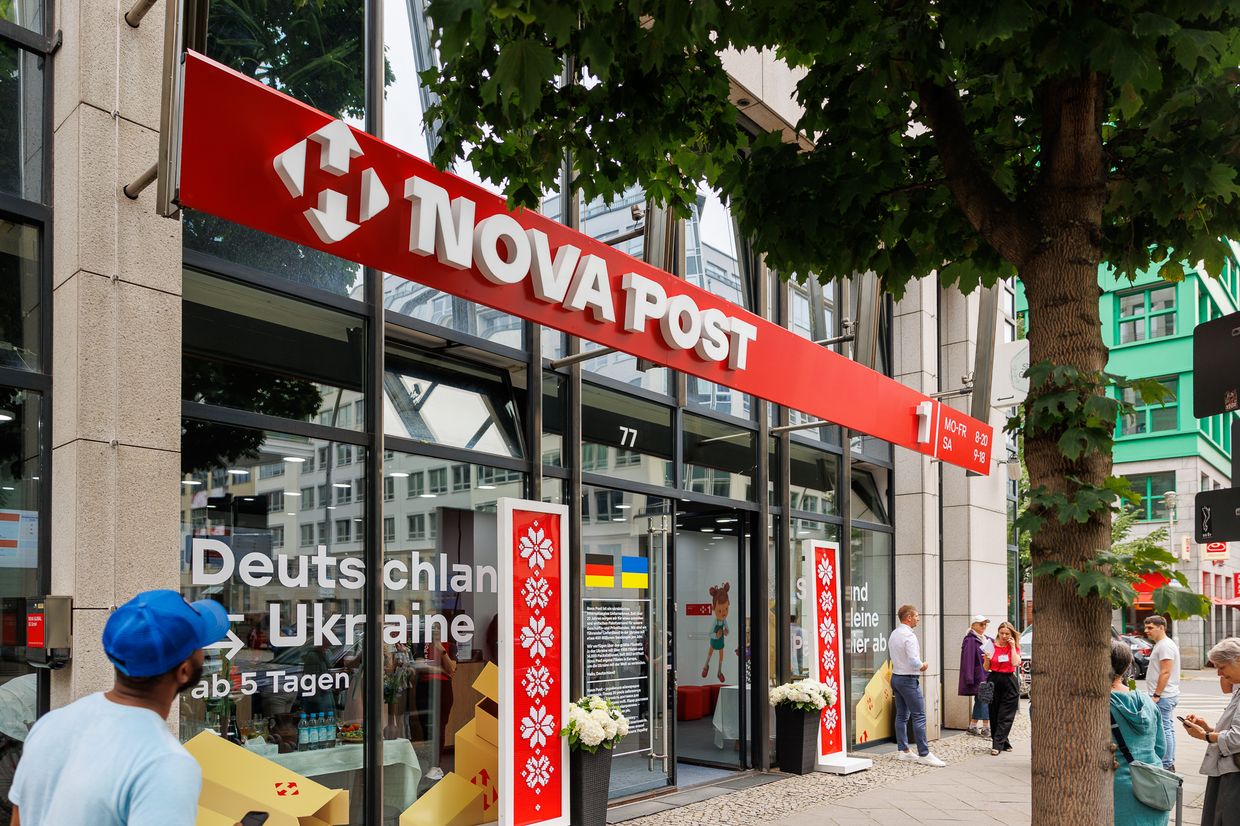Talking business in Ukraine: CEO of Ukraine's largest grocery chain on navigating war, plans for future

After being pruned by the Russian invasion, Ukraine's largest supermarket chain, ATB-Market, is fighting to grow back bigger and better.
Like the German chains Aldi and Lidl, ATB prioritizes low prices and big selections. This proved popular with shoppers — the company entered the full-scale war with over 1,300 stores.
When Russia attacked, 31 ATB stores were destroyed and 79 more ended up in occupied territories. As of today, the company has yet to fully replace these losses.
Even so, ATB has worked to provide Ukrainians with essential goods, while actively trying to develop. The chain plans to open more than 60 stores in 2024.
As part of an interview series with Ukrainian business leaders on doing business during the war and their outlook for 2024, the Kyiv Independent sat down with Boris Markov, CEO and Chairman of the Board of Directors of the ATB Corporation, to discuss the company's resilience, expansion plans, and commitment to supporting the Ukrainian community.
ATB's strength is its ability to adapt to the war's changing circumstances, according to Markov.
The following interview has been edited for clarity.
The Kyiv Independent: How did ATB survive these almost two years of a full-scale war?
Boris Markov: ATB celebrated its 30th anniversary this fall. During this time, we have become the absolute leader in the domestic food retail industry and have, together with society, gone through five major crises: the financial crises of 1998 and 2008, the beginning of the war of 2014-2015, two years of the global coronavirus pandemic, and a full-scale invasion by the enemy. The latter has become the most severe and unprecedented test in the country's recent history.
Having passed an actual crash test in the first months of the war, when logistics chains were disrupted, sea routes blocked imports, and there was panic among manufacturers, carriers, etc., we not only managed to stay afloat but also became an example of a sustainable and responsible business.
Since February 2022, we have opened 20 new ATB markets and reconstructed 40 in a new black store design, seven restored after hostilities. Unfortunately, another 31 stores have been destroyed, and 79 are under occupation.
Today, ATB is a stronghold of food security for the entire country, providing systematic assistance to the Armed Forces, volunteer formations, volunteer organizations, internally displaced persons, medical institutions, first responders... The total amount of aid has already exceeded 1 billion hryvnias ($25 million) and continues multiplying as our charitable projects continue. We clearly understand that only consistent work to support and help our defenders brings the victory everyone is waiting for closer.
The Kyiv Independent: If we compare ATB in December 2023 to January 2022, how does the company differ from the pre-war period?
Boris Markov: On the eve of the war, 1,322 ATB supermarkets were operating in different parts of Ukraine. Society and business had just begun to recover from the COVID-19 pandemic. Nevertheless, there was no sigh of relief, as it was evident that the enemy was amassing massive forces at our borders and preparing for an attack.
Of course, it was impossible to prepare for the war 100%. But in 2014, we experienced the annexation of Crimea and the occupation of Donetsk and Luhansk regions, so we clearly understood what things we needed to pay attention to.
We worked out mechanisms for switching to manual control for prompt response to circumstances and delegating powers, significantly accelerating necessary decision-making processes.
In the current conditions, what could take a week in peacetime can be resolved in less than an hour. We are much more prepared for challenges, such as power outages or peak demand for specific categories of goods.
As the saying goes, what doesn't kill you makes you stronger.
The Kyiv Independent: What are ATB's losses since the beginning of the full-scale invasion? Do you plan to sue Russia, and how can these losses be compensated?
Boris Markov: About a hundred stores were destroyed during the war or fell under occupied territories. The multi-temperature warehouse center in the Kyiv region, which supplied products to central Ukraine and the northern areas, was destroyed. The enemy also captured a similar warehouse center in Kherson Oblast. It is difficult to calculate the exact amount of losses now, but it is already clear that our losses amount to billions of hryvnias.
It will be more appropriate to talk about compensation after our victory. Unfortunately, some losses can never be compensated in any way. As of today, about 4,300 of our employees have joined the ranks of the Armed Forces. Some of these heroes have already suffered severe injuries or died.
The Kyiv Independent: Many entrepreneurs look to the plans of large businesses to forecast their development for 2024. How do you plan to develop your business during the war? What scenarios are you building depending on when victory comes?
Boris Markov: We will look at the situation with cautious optimism. The war continues, the economy is complex, and the population for guaranteed fresh produce and quality essential goods at a fair price (always works with a minimum fixed margin, in fact offering the first price after the manufacturer) has stayed the same.
We plan to open 60 new stores in 2024. This plan is approximately half as many as in pre-war times. We also plan to modernize 31 stores in our updated black store design.
The Kyiv Independent: What advice can you give entrepreneurs and international companies as a CEO on properly planning for the next year?
Boris Markov: First, being prepared to make operational changes to any plans is crucial. The situation can be volatile, as can consumer demand. This is especially noticeable when a country is at war, and the enemy's primary goal is to inflict as much damage as possible on the economy, infrastructure, business, etc.
Of course, projects to support Ukrainian defenders, charitable initiatives, and activities that strengthen morale and, step by step, bring our victory closer should be included in the plans.
The Kyiv Independent: How do you assess the current business climate in Ukraine?
Boris Markov: The business climate is susceptible to any processes in society. This should also be taken into account when building plans or specific projects. As military observers say, the situation is difficult but under control. What it will be in the future depends largely on each of us.
The Kyiv Independent: What does big business expect from the government now? What would they like the government and the authorities to do for retail and industry in general?
Boris Markov: If a business is transparent, honest, and responsible, like АТВ, then the expectations from the government are appropriate. Clear and transparent rules of the game play a significant role in the relationship between business and government structures. Legislative support is also essential.
The Kyiv Independent: Everyone had an idea of what leadership meant before the war. How has your view of leadership changed during the war?
Boris Markov: During the war, leaders of socially oriented businesses needed to be not only a driver of the industry but also to fulfill the mission of unity and set trends. An example was АТВ’s initiative for its 30th anniversary — we raised 168 million hryvnias for the Armed Forces.
What have you been doing as a company to keep your employees safe and to keep operations going during the war?
Boris Markov: In addition to restoring damaged stores, the company is preparing to open new ones in relatively safe western regions, which have become a hub for internally displaced persons.
Due to the war, it was necessary to decentralize supplies to some extent and introduce three types of assortment: in relatively safe regions, we have the usual 2.5–3.5 thousand items. In the areas closest to the contact line, there are about 1,500-1,700 items. In settlements where hostilities are taking place, a "military" assortment is used. It consists of 400-500 of the most essential products and goods.
Of course, when people need to go to shelters as quickly as possible, air raid alerts introduce adjustments to the work.

The Kyiv Independent: How do you integrate veterans who are returning to peaceful territories?
Boris Markov: We have experience integrating veterans (from the war that started in 2014) who have returned to civilian life, were employed, and found their calling. (Veterans) got interesting jobs in leadership at ATB, competitive wages, and successfully climbed the career ladder.
The Kyiv Independent: Development during the war was a period of significant challenges for the company, but many people consider it a period of open opportunities. What are the options for business development now?
Boris Markov: In the challenging conditions of war, we acquire new skills and develop the most effective strategies, but this should not be considered a period of open opportunities.
On a mental level, we are becoming more conscious and responsible. We clearly understand that we bravely resist terror and evil here and now. The misfortune of war will soon pass, and then we will return to the question of new open opportunities.
The Kyiv Independent: What has changed in you as CEO and person in these almost two years of war?
Boris Markov: Like most Ukrainians, I have learned to appreciate simple things that matter. I have learned to sincerely rejoice at seemingly small victories, from which one great victory and peace will surely come. Glory to Ukraine!

















